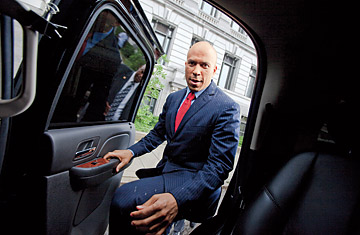
Cory Booker, Mayor of Newark, NJ, enters his SUV at City Hall while en route to a meeting.
Many residents of newark, N.J., long one of America's most troubled cities and favorite punch lines, would love to hop on the next bus down the Turnpike and never look back. Sure, the city has made strides since its devastating race riots in 1967 — there's a sparkling-new downtown arena, some bright residential complexes, the gestation of a hipster scene. But Newark is still a drug-infested, poverty-stricken place where rubble piles up on Park Avenue and the shabby Hotel Riviera sits across the street from an auto-parts joint, around the corner from an abandoned five-story building.
So if Newark Mayor Cory Booker, the political phenom who was most likely to be introduced as the "first black President" at speeches before we actually elected the first black President, had accepted a chance to run Barack Obama's new Office of Urban Affairs earlier this year, could anyone have blamed him? After all, Newark's mayors — Hugh Addonizio, Sharpe James — tend to end up in the jailhouse, not the White House. What could be more tactical for a young, telegenic Rhodes scholar with infinite political potential? A home among the Georgetown salons, minutes from the national talk-show studios? Or a brownstone in Newark's South Ward, where on a July day, six teens shared a joint about a block from the mayor's residence? At 10 in the morning.
Despite all the rational reasons to pursue the position, Booker turned down the President. "That job is not playing to my strengths," says the mayor while sitting on a couch in his city-hall office. It's closing in on 8 o'clock the night before the three-day July 4 weekend. He has just wrapped up a meeting with his police director and a conference call with the local electric company, but Booker, 40, doesn't know when to quit working. Or talking. Some politicians ramble on in paragraphs; Booker pontificates in pages. Chapters, even. "That's not playing to my sense of purpose," he says of the White House position. "And right now, I do believe, as immodest as it sounds, I'm the right guy at the right time for this city."
Is he? Newark had its glory days as a multicultural melting pot that produced luminaries like novelist Philip Roth and Supreme Court Justice William Brennan. It was a place that, with its strategic location in the Northeast urban corridor and assets like a thriving port, had the potential of Los Angeles. But since the '67 riots and the epic flight that followed, Newark (pop. 280,000) has been searching for its elusive renaissance. Booker, a black kid from the lily-white suburbs of northern New Jersey, has promised to deliver it and prove that an educated, technocratic outsider can rewrite the rules for how America's most challenged cities are governed.
The Booker bio is irresistible — and familiar: he arrived in Newark fresh out of Stanford, Oxford and Yale Law, passing up riches to save a poor city. He moved into a decrepit Newark public-housing project, which has since been torn down, and was elected to the Newark city council at age 29. In 2006, at 37, he became mayor. To his supporters, who include A+ listers like Oprah Winfrey, Bon Jovi and Brad Pitt, plus an élite cadre of Wall Street and Silicon Valley scions, Booker's self-sacrificial tale is heroic. To his critics, Booker is still a publicity-loving political opportunist, a permanent outsider using the citizens of Newark to jump-start bigger things for his career.
But he passed up a job that would seem to be a step up, and now, in the age of Obama, how big can Booker actually get? Now that we actually have an African-American President, some say it's natural to start scouring the country for the next one. But in another sense, Obama's election has diluted the Booker brand. The challenge for African-American stars like Booker is to separate themselves from Obama's larger-than-life persona and not seem like Barack wannabes. So is Booker just Obama-lite, or can he really govern? And there's an even larger question: Can anyone save Newark?
A Crime-Dog Mayor
The centerpiece of Booker's campaign was a promise to improve public safety in Newark. "You're a children's foundation, you're a health-care foundation — don't you know that if a kid gets shot, every one of the issues you care about gets undermined?" Booker says.
